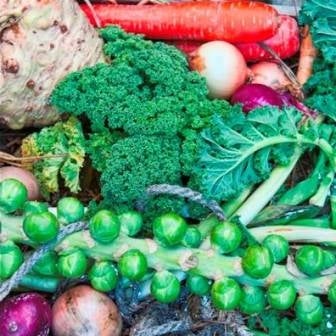Small Changes, Big Impact
Access to Healthy Foods
San Mateo County is one of the most affluent counties in the nation. However, many low-income, displaced and homeless residents don’t have access to healthy meals. We know that the food around us influences how and what we eat. People who are homeless face additional barriers to accessing healthy foods, where the healthy choice is rarely the easy choice. The 2015 Census determined there were 1,772 people who are homeless in San Mateo County, 141 in South San Francisco and 178 in East Palo Alto.
Provide and Conquer
Samaritan House in South San Francisco and Project WeHOPE in East Palo Alto provide emergency, transitional housing and other supportive services such as case management, groceries, and meal programs for low-income homeless families and individuals. Both organizations aim to serve healthy meals to clients, but struggled to keep perishable foods stored properly causing many fresh fruit and vegetable donations to spoil or be thrown out. As a result, processed snack and sugary foods had been more easily distributed to clients in lieu of healthier food options.
To bolster community-based efforts to increases access to healthy food sources, Get Healthy San Mateo County (Get Healthy SMC) provided funding for a commercial refrigerator at both Samaritan House and ProjectWeHOPE. With improved storage, clients were able to have access to healthier food choices – replacing less-perishable, unhealthy food and beverage offerings with fresh fruits, vegetables and water.
Tools and Strategic Partnerships
Project WeHOPE’s existing partnerships with Whole Foods, Second Harvest Food Bank, Saint Samuel Church, numerous volunteers and donations were invaluable in the project’s success. Whole Foods took the newly stored healthy food to a new level to help with behavioral change, leading nutrition classes by providing the instructor, food, and cooking supplies, which staff felt was crucial in changing clients’ attitudes about healthy food. Pre- and post-test surveys revealed that WeHope shelter clients showed a significant increase in consumption of fresh fruits and vegetables and knowledge about benefits of healthy eating and reduced the amount of fast food consumed.
All food at Samaritan House’s Safe Harbor shelter is prepared offsite. Fresh Fruits and vegetables donated by mainly by the Second Harvest Food Bank were going waste due to the lack of refrigeration which also contributed to the limited diversity, freshness, quality, and types of foods that were served at daily mealtimes. Now, homeless residents of the Safe Harbor shelter are served fresh fruits and vegetables with their daily served meal at least five days per week. Samaritan House found this project successful because this targeted grant had a transformative effect on the daily operations of the shelter.
Challenges
While the equipment purchasing and implementation was relatively seamless, taking the new availability of healthy food to the next level for health is more of a challenge. Some clients at Project WeHOPE expressed they knew enough about nutrition and did not want to participate in the classes. The shelter made the classes mandatory as part of the transitional/supportive housing program in order to keep clients participating. Samaritan House also explored adopting an agency-wide wellness policy, which needed board consideration and approval and plans to have follow-up discussion to determine best course of action to implement such a policy.
Looking to the future
With the new refrigerators and existing strong partnerships already in place, these organizations were able to help ensure their clients have access to nutritious food they need to prevent hunger and malnutrition. The continued service of healthy fruits and vegetables to a vulnerable population who generally have poor health and nutrition has had immediate positive short-term and potentially long-term effect on their clients. Project WeHOPE looks forward to maintaining their partnerships and current wellness classes offered as well as creating additional strategic partnerships with other organizations. Samaritan House encourages other organizations to challenge themselves by taking on these types of projects. Both organizations continue to provide fresh fruits and vegetables for clients on a daily basis.


